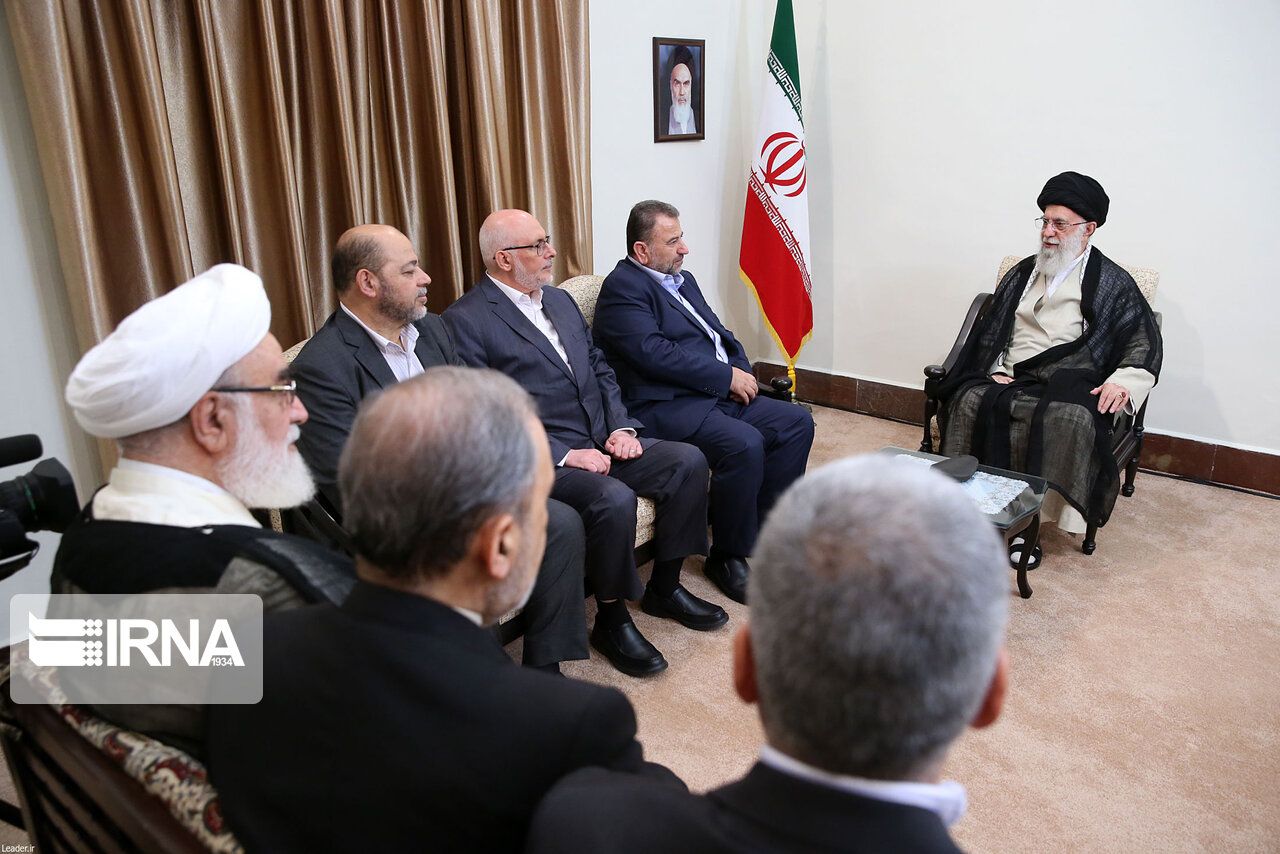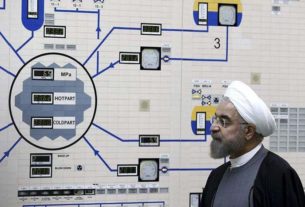Photo Credit: IRNA English via Twitter screen grab

{Originally posted to the Gatestone Institute website}
Iran seems concerned that its Palestinian allies in the Gaza Strip may reach a long-term ceasefire with Israel. That is probably why Iran summoned leaders of Palestinian Islamic Jihad (PIJ) to Tehran after reports in the Arab media suggested that the Egyptians have made significant progress in their efforts to achieve a long-term ceasefire between the Gaza-based Palestinian factions, including Hamas and PIJ.
‘);
_avp.push({ tagid: article_top_ad_tagid, alias: ‘/’, type: ‘banner’, zid: ThisAdID, pid: 16, onscroll: 0 });
According to the reports, the leaders of Hamas and PIJ who visited Cairo agreed to a long-term ceasefire with Israel. Both groups reportedly told the Egyptians that they would commit to the proposed ceasefire only if Israel halts targeted killings of Hamas and PIJ operatives.
Despite the reports, PIJ officials were quoted as denying that they had agreed to “consolidate” the ceasefire understandings reached with Israel earlier this year under the auspices of Egypt, Qatar and the United Nations. The PIJ leaders reportedly informed the Egyptian mediators that while they were opposed to a long-term ceasefire with Israel, they would honor a formula according to which “calm would be met with calm.” What PIJ is saying, in other words, is that they will attack Israel only in response to Israeli “aggression” on the Gaza Strip.
Hamas has also denied the reports about an imminent Egyptian-brokered long-term ceasefire with Israel. Yahya Musa, a senior Hamas official in the Gaza Strip, dismissed the reports as “nonsense” and “fake news.”
Another senior Hamas official, Mahmoud Zahar, downplayed the reports about a possible long-term ceasefire with Israel. He said that even if his group agrees to a temporary cessation of terror attacks against Israel, that would be only to allow Hamas to continue stockpiling weapons. “There’s no ignoring our main goal: the liberation of all of Palestine,” Zahar explained. “Whoever tries to portray the calm as a form of security cooperation or agreement with the [Israeli] enemy is mistaken.”
The statements by the Hamas and PIJ leaders contradict the sense of optimism voiced by the Egyptians after the ceasefire discussions in Cairo in the past week.
The Egyptian optimism is apparently based on what Cairo’s senior intelligence officials heard from Hamas and PIJ during closed door meetings. Both groups reportedly assured the Egyptians that the Palestinian factions in the Gaza Strip are interested in preserving the ceasefire understandings with Israel.
Yet, the moment the Hamas and PIJ leaders left Cairo earlier this week, they appeared to recant the announcement. They categorically denied the reports and claimed that “significant progress” had been reached towards achieving a long-term ceasefire with Israel.
Is it possible that the two groups lied to the Egyptians by leading them to believe that Hamas and PIJ are keen on a prolonged period of calm with Israel? Or is there another reason why Hamas and PIJ are now telling everyone that they never agreed to the Egyptian ceasefire proposal?
There is only one explanation as to why Hamas and PIJ seem to be in a panic: fear of Iran’s response to any deal with Israel. Hamas and PIJ have long been receiving financial, political and military aid from Iran so that they could continue the jihad against Israel. Obviously, Iran cannot afford to lose its Palestinian proxies, particularly not when Tehran’s militiamen and political agents are increasing their activities in Iraq, Syria, Yemen and Lebanon.
A PIJ delegation headed by the group’s secretary general, Ziyad al-Nakhalah, is now on its way to Tehran, where its members are expected to assure the Iranian leaders that, as a result of the discussions in Cairo, they have not abandoned the fight against Israel.
Iran’s main objective is evidently to ensure that Hamas and PIJ will continue to serve as its trusted agents in its war against Israel. Arab political analysts believe the Iranians are now seeking to retaliate for Israeli airstrikes on pro-Iranian militias and bases in Iraq and Syria.
“Iran wants to use the Palestinian Islamic Jihad rockets as a response to Israel’s missile attacks on pro-Iranian militias in Syria and Iraq,” said Arab political analyst Abdel Moneim Ibrahim. “At the same time, however, Iran does not want to expand the scope of military confrontation to a point where Israel would target bases of the Iranian Revolutionary Guard inside Iran. The biggest tragedy in this game between Israel and Iran and its proxy in the Gaza Strip is that there are dozens of innocent Palestinians dying in every confrontation.”
Iran’s policy seems to be keeping the conflict between Israel and the Palestinian groups in the Gaza Strip on a low flame.
That policy means a slow drip of rockets attacking Israel from the Gaza Strip every now and then, while making sure that the violence does not deteriorate into an all-out war in the Hamas-ruled coastal enclave.
The Iranians are well aware that such a war could result in the total destruction of its proxies in the Gaza Strip, while sporadic rocket attacks will only draw a restrained response from Israel.
The Iranian plan to foil a long-term ceasefire in the Gaza Strip may also be seen as part of Tehran’s effort to divert attention from the widespread protests that have erupted in Iran in recent weeks. Dozens of protesters have been killed during demonstrations against a fuel subsidy cut.
What is probably most disturbing for Iran’s leaders are the slogans some of the protesters have been shouting: “No to Gaza, no to Lebanon.”
These slogans are directed against Iran’s financial support for Hamas and PIJ in the Gaza Strip and Hezbollah in Lebanon. The protesters are saying, in other words, that the Iranian people are fed up watching their country deliver hundreds of millions of dollars to Palestinian and Lebanese terrorist groups instead of improving the economic situation in Iran.
Palestinians say that in addition to the financial and military aid to Hamas and PIJ, Iran has also been funding various projects in the Gaza Strip, including building new homes and paying stipends to families of Palestinians imprisoned by Israel for their involvement in terrorism against Israelis.
Palestinian political analyst Mohammed Anabtawi believes that the Iranian aid is aimed at “sabotaging” Egypt’s efforts to achieve a ceasefire in the Gaza Strip and “driving a wedge” between Hamas and the President Mahmoud Abbas’s West Bank-based Palestinian Authority. “If Iran was sincere about its aid, it would have channeled it through the Palestinian Authority,” Anabtawi said. “But this is politically motivated aid with an agenda that does not serve the interests of the Palestinians. Iran is playing the Gaza card as part of its conflicts in other parts of the world.”
Iran is apparently determined to pursue its goal of exporting its “Islamic Revolution” to as many Arab countries as possible, including the Palestinian arena. Another Iranian goal: the elimination of Israel.
Iran can achieve its goal only if its proxies and militias continue to meddle in the internal affairs of the Arab countries and launch more attacks against Israel.
This is how Iran’s leaders see the situation: “We are not sending these groups and militias cash and guns so that they can strike ceasefire deals. As long as we’re supplying them with money and weapons, they must do anything we want.”
That is why it is safe to assume that even if the Egyptians manage to secure any kind of a ceasefire between the Palestinian groups and Israel, the leaders of Tehran will do their utmost to obstruct such an agreement.
‘);
_avp.push({ tagid: article_top_ad_tagid, alias: ‘/’, type: ‘banner’, zid: ThisAdID, pid: 16, onscroll: 10 });



